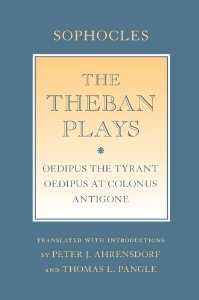• Home | • Curriculum Vitae: » PDF | • Return to Books & DVD


The Theban Plays: Oedipus the Tyrant, Oedipus at Colonus, Antigone
Cornell University Press, 2013
The timeless Theban tragedies of Sophocles—Oedipus the Tyrant, Oedipus at Colonus, and Antigone—have fascinated and moved audiences and readers across the ages with their haunting plots and their unforgettable heroes and heroines. Now, following the best texts faithfully, and translating the key moral, religious, and political terminology of the plays accurately and consistently, Peter J. Ahrensdorf and Thomas L. Pangle allow contemporary readers to study the most literally exact reproductions of precisely what Sophocles wrote, rendered in readily comprehensible English. These translations enable readers to engage the Theban plays of Sophocles in their full, authentic complexity, and to study with precision the plays' profound and enduring human questions. In the preface, notes to the plays, and introductions, Ahrensdorf and Pangle supply critical historical, mythic, and linguistic background information, and highlight the moral, religious, political, philosophic, and psychological questions at the heart of each of the plays. Even readers unfamiliar with Greek drama will find what they need in order to experience, reflect on, and enjoy these towering works of classical literature.
About the Co-Author
Peter J. Ahrensdorf is James Sprunt Professor of Political Science and Affiliated Professor of Classics at Davidson College. He is the author of Greek Tragedy and Political Philosophy: Rationalism and Religion in Sophocles' Theban Plays and The Death of Socrates and the Life of Philosophy: An Interpretation of Plato’s Phaedo.
Peter J. Ahrensdorf is James Sprunt Professor of Political Science and Affiliated Professor of Classics at Davidson College. He is the author of Greek Tragedy and Political Philosophy: Rationalism and Religion in Sophocles' Theban Plays and The Death of Socrates and the Life of Philosophy: An Interpretation of Plato’s Phaedo.
In emphasizing the political elements of the plays, Professors Ahrensdorf and Pangle spur their readers — our students — to engage deeply with Sophocles’ masterpieces.
Their incisive reflections interrogate the texts in original and thought-provoking ways, particularly in regard to their political elements. Even where we disagree with them, their ideas merit serious consideration.
The translators situate Oedipus the Tyrant in its political context and ask probing questions about the nature of tyranny, guilt, and knowingness.
The introductions to Oedipus at Colonus and Antigone are similarly rich in ideas. Alternately considering matters of justice, allegiance and political legitimacy, Ahrensdorf and Pangle mine themes of timeless interest and application. In Antigone, they question Creon’s injunction to obey — son to father, young to old, ruled to ruler — and his admonition that “there is no greater evil than anarchy.” In these two principles, one finds the root of arguments, both ancient and contemporary, over the nature of political legitimacy and stability.
-Bryn Mawr Classical Review 2014.10.44
Peter J. Ahrensdorf and Thomas L. Pangle make a very persuasive case that there remains a need for literal translations of the Theban Plays that render clearly and consistently all key terms in nonarchaic English. These translations combine a remarkable fidelity to the originals with a readable style that is also quite powerful and even moving.
-Robert C. Bartlett, Behrakis Professor of Hellenic Studies, Boston College
These excellent translations will serve a useful purpose in the classroom in the hands of serious students of the profound relationship between literary wisdom and ethical-political thought.
-Leslie Rubin, Duquesne University
Students will be forever grateful for putting a ‘meticulously faithful rendition’ into English of Sophocles’ ‘very words, in all their pregnant ambiguities and astounding twists and turns’ (p. xvi). Or at least they will up to a point, for no translation is an adequate substitute for the Greek text itself, which is full of wordplay and allusion of a kind that does not easily lend itself to translation into another language. Nevertheless, Ahrensdorf and Pangle have striven to produce a text that will go a fair way towards assisting the interested Greekless student to reconstruct the ancient picture – which is the only one that matters.
-Polis: The Journal for Ancient Greek Political Thought

